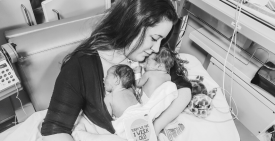
I still remember the day. I was seven years old, sitting at the sun-dappled kitchen nook that my father had lovingly built. My chin barely grazed the table top, and my mother led the conversation.
“April, you have just learned how to add, subtract, multiply and divide. You like numbers. We have an idea that we think will help you learn even more. From today, we’re putting you in charge of your own budget.”
At the time, I couldn’t quite process what this meant. What about my allowance? Was this like a budget for pocket money, or for everything?
It turns out, my parents were quite serious. If not everything, I was in charge of almost everything: from school supplies to underwear, as well as “fun money” (which I quickly learned could be in short supply). I could earn as much as I wanted, though the going rates for seven-year-old labor weren’t especially lucrative. My parents were public school teachers and lived on a very modest income.
Unsurprisingly, I became entrepreneurial and resourceful fast. I began using whatever skills I had to make ends meet: I learned how to sew and sold simple clothes (this also became the primary way I ever had “new” togs). I washed cars, cleaned our neighbors’ homes, and mowed lawns. I also learned how to budget, what loans and compounding interest are, and eventually how financial markets work. Had this happened in the smartphone era, I’m pretty sure I would have developed a scrappy app to help out.
From that point on, I lived in limbo of not knowing if I would ever have enough. My parents made it clear that if I couldn’t make ends meet, I shouldn’t ask them for help. My mother’s daily mantra was self-sufficiency and independence. My seven-year-old self felt abandoned fairly often, as if I’d been thrown into the deep end without much of a parental (or other) rope; it would have been far better to focus on inter-dependence and empowerment, and to set shared goals we could work on together. But I am getting ahead of the plot.
Little did I know how much these experiences would teach me, nor how much I would need these skills, nor the emotional burden it would impose (which is a whole other story). When I went to college, I remember being shocked when my friends would simply ask their parents for money. They were 18 and had never had to budget?! I was both horrified and a tad envious.
In my junior year, while I was studying abroad in England, both of my parents were killed in a car accident. Overnight, my world flipped tragically upside down. Never mind grieving; how was I to take care of myself? I still remember, in the immediate aftermath of the tragedy, putting together a budget; whether or not it made any sense, it brought comfort.
More than 30 years later, bittersweet as it has been, I continue to reap the benefits of my childhood budgeting lessons. Back in my 20s, with zero parental accountability (and an irrational-yet-perfectly-sensible fear that I would die soon too) I spent nearly four years traveling, with the goal of seeing as much of the rest of the world as I could. I researched and guided hiking and biking trips, which provided enough income to keep going and earned me an honorary black belt in logistics and management. I learned that traveling often costs less than a typical young professional’s burn rate in the United States. Even today, I can make a Dollar (Euro, Peso, Baht, Rupee, Yuan, Ringgit or whatever other currency I’m dealt) last forever, without compromising quality of experience.
These early insights continued to pay dividends as I grew up: Financing graduate school carefully and doing long-term financial planning far earlier than I would have otherwise. My parent’s deaths forced me to set priorities, ask hard questions and get clear on setting goals and expectations. I have also been very fortunate to have trusted advisors along the way; they have been essential to my survival and decisions.
I’d never wish for any child to have to be self-sufficient, nor to experience death and loss at a young age. But children are ready for financial responsibility far earlier than adults tend to think they are, and empowering youth with financial skills will pay off — many times over — during the course of their lifetime: a lesson I learned best in my deepest grief. Here are five ways to begin:
1. Make financial literacy something you learn together, and have fun doing it. For children, developing a budget may seem abstract and out of reach. Start small and build goals together. For example, pick a savings goal — such as a trip, or expensive device — and develop a savings plan to “earn” it over time. Or invest $20 in the stock market, and have the child present which company it should be invested in (and why). Then track it over time… and decide what to invest in next.
2. Apply this to their future. Given rising costs of education and uncertainty about the future of jobs and work, it is never too soon to plan ahead. Actively develop and fund college savings accounts together. Encourage children to start a small business for something they care about. Current projections show that self-employment is more likely than getting a traditional “job” (and growing three times as fast), so these skills will be essential.
3. Invite their (and your) friends and families. Make it a group effort. Host parties. Create games. Let the kids lead — before long, they may teach parents a thing or two!
4. Make it clear that money is no substitute for love. My parents could have done this part much better. Make it clear to children that they are not on their own, and that you love them unconditionally. At the end of the day, no amount of money can ever replace the care and warmth of another human being.
5. Remember, this is part of your legacy, too. Even if you plan on being around for a long, long time — as my parents did, and as I do too — one simply never knows. Whether you live to be 30 or 130, having financially literate children is one of the greatest gifts you can provide. It’s not about “how much money” you have, but rather how to live in a way that’s responsible, caring and wise — skills that are an investment in your family’s future.
April Rinne is an independent advisor, speaker and globetrotter. More at http://aprilrinne.com.








